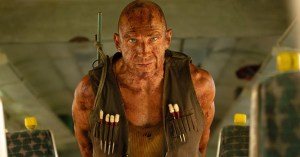10 Films and TV Shows to Watch on Juneteenth
Celebrate Juneteenth with these 10 liberating titles featuring characters and stories that redefine the meaning of freedom.
Juneteenth is about liberation. On June 19, 1865, two years after President Lincoln’s Emancipation Proclamation, Union troops announced to nearly 250,000 previously unaware African Americans in Texas that they were free. Over a century and a half later in 2021, the day was officially recognized as a Federal holiday.
The African American experience showcases what it means to have freedom in many ways — in our hairstyles, our language, our music, our food, our fashion, and especially in our cherished films and TV shows. Cinematic representation has allowed Black individuals to see themselves within beloved characters that feel familiar, and through these characters, we give ourselves permission to feel empowered and embrace the ebb and flow of our own individuality, taking freedom by a new narrative into our own hands.
As our nation observes Juneteenth, we offer a list of 10 movies and TV series highlighting Black characters and stories that unapologetically embrace what it means to live freely.
Moonlight
(2016)
Set amid circumstances frequently characterized by violence and aggression, Barry Jenkins’ critically acclaimed Moonlight explores the development of a reserved and mild-mannered Chiron. In three chapters — titled Little (in which Chiron is played by Alex R. Hibbert), Chiron (Ashton Sanders), and Black (Trevante Rhodes) — audiences witness the intersection of queer identity and the Black experience through the lens of an African American male. Chiron balances the pressures of conforming to “manly” stereotypes with simply existing, dissecting the hypermasculinity pushed onto Black men and boys, a conversation that is often considered taboo within the culture. The Oscar-winning film explores Chiron’s coming of age in a profound way, pushing LGBTQIA+ media forward in the Black community.
Lean on Me
(1989)
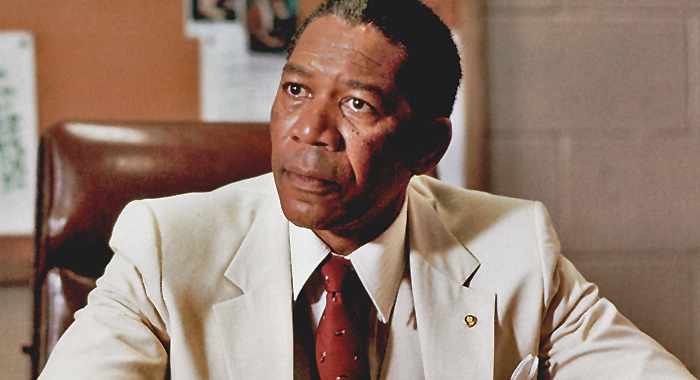
(Photo by ©Warner Brothers)
Based on the true story of Joe Louis Clark, the former principal of Paterson, New Jersey’s Eastside High School, Lean on Me stars Morgan Freeman as the inspirational, iron-fisted educator who touched the hearts of many. Freeman’s portrayal presses firmly into a heartfelt passion for restructuring the lives of underfunded youth of color, as Clark acts as a figure of discipline and upstanding character to students, staff, and parents alike. The film sheds light on the plight of institutionalized education in Black neighborhoods, and with lines like, “They used to call me Crazy Joe. Now they call me Batman!”, Principal Clark is a provocative figure that sticks with you long after the credits roll.
Pose (2018-2021)
In New York’s 1980s ballroom scene, an all-encompassing and endearing house mother whose love knows no bounds takes shape in the form of Blanca Evangelista (Michaela Jaé Rodriguez) in Ryan Murphy’s Pose. A trans woman living with HIV, Blanca decides not to let her diagnosis be a death sentence, instead taking fate into her own hands by housing impoverished, queer youth to begin a chosen family of her own and secure her legacy. Rodriguez’s portrayal of Blanca is as selfless as it is fearless, with the character pictured uplifting her community, succeeding professionally, and living unapologetically despite the odds stacked against her. For her stellar work in this role, Rodriguez became the first transgender actress to be nominated for the Emmy for Outstanding Lead Actress in a Drama Series and the first to win a Golden Globe (Best Actress – Television Series Drama).
Insecure (2016-2021)
From motivational mirror raps to making money moves, Issa Dee of Issa Rae’s Insecure shows us exactly what it means to be authentically ourselves, no matter how unconventional or eccentric we may be. Issa’s bubbly, no-filter personality shines in almost any situation encountered on the show, including run-of-the-mill HR meetings, heated romance scenes, and friendship break-ups. Throughout the progression of the series, Issa’s character is increasingly multi-layered, with hues of seriousness, humor, sensuality, and awkwardness that accurately reflect the experiences of Black women, who have historically been portrayed as one-note. Rae dispels all the outside noise and delivers a performance that is removed from Hollywood’s typical conventions of African American womanhood, creating space and visibility for a wide range of Black individuals.
The Color Purple
(1985)
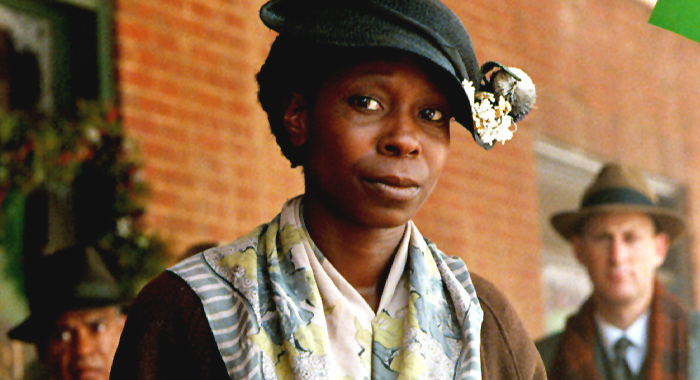
(Photo by ©Warner Bros.)
The story of The Color Purple’s Celie (Whoopi Goldberg) is about finding one’s voice. Set in the deep South at the turn of the century, and based on Alice Walker’s Pulitzer Prize-winning novel, the story explores Celie’s journey of gaining the wisdom, knowledge, and confidence to stand up for herself, blossoming before the viewer’s eyes. In her first major film, Goldberg expertly carries the emotional weight of the character by supplying a delicate patience in the beginning that transforms into powerful ownership over her God-given rights. “I’m here!” — a statement echoed in Fantasia Barrino’s portrayal in The Color Purple (2024) — perfectly sums up Celie’s liberation from the shackles of generational trauma.
The Pursuit of Happyness
(2006)
Chris Gardner is a homeless, recently divorced father struggling in the heart of San Francisco who, in spite of the challenges before him, is persistent in his will to provide for his son and himself. Based on the memoir of the real-life Chris Gardner, who battled homelessness in the early 1980s before becoming an executive stockbroker, The Pursuit of Happyness finds Will Smith playing the clever and resourceful salesman, who experiences turmoil as he searches for a steady income. In the midst of financial ruin with all odds against him, Gardner is portrayed as someone who leverages his creativity and optimism to his advantage, highlighting the belief that the state of your mindset can eventually manifest into a better reality.
Ma Rainey's Black Bottom
(2020)
Set in the 1920s at the peak of the women’s liberation movement, Ma Rainey’s Black Bottom recounts the tale of the late Mother of Blues, Ma Rainey (Viola Davis). A renowned recording artist known for her powerful voice, Rainey is aware of the commodity she provides to the white record executives who “don’t care nothing about me.” Using this to her advantage, the singer establishes firm boundaries for how she will and won’t conduct business on her own terms. The film, co-starring Colman Domingo and the late Chadwick Boseman, is pulled directly from August Wilson’s 1982 stage play of the same name, inspired by the real life of Gertrude “Ma” Rainey. Exploring themes of sexuality and female empowerment, the Netflix exclusive celebrates Black individuality from a historical lens.
The Jeffersons (1975-1985)
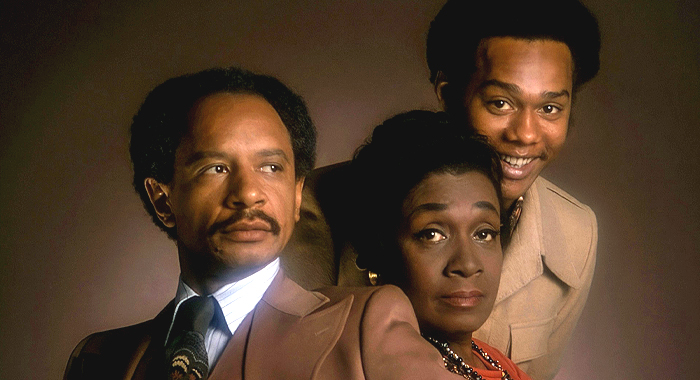
(Photo by Mario Casilli/©CBS)
In the early 1970s, it wasn’t common to hear about many African American entrepreneurs who were millionaires. Enter George Jefferson (Sherman Hemsley), the wise-cracking, tell-it-like-it-is co-founder of Jefferson Cleaners, a largely successful laundromat chain in the city of Harlem, NY. George’s spunky attitude made him unafraid to go toe-to-toe with anyone, including his white counterparts. Audiences took a profound liking to the comedic wittiness displayed by George Jefferson, who wielded the same assertiveness of powerful, typically white men of the time. A Black man speaking freely, flaunting wealth, and not giving a damn about who did or didn’t approve was a revolutionary sight to see for audiences in the 1970s that still holds weight even today.
Nappily Ever After
(2018)
Violet Jones (Sanaa Lathan) has never been better. She’s a successful businesswoman — she has the job, she has the man, and she has the hair, which she has been straightening ever since her mother Paulette (Lynn Whitfield) convinced her that her natural naps were unappealing. Things seem to be working for Violet until an incident leaves her spiraling into a cycle of mishaps, ultimately prompting her to shave her precious hair bald. In this story of restarting, Violet is challenged to separate her self image from the way she looks and find the woman within, outside of the things she can hide behind. Nappily Ever After chronicles her self acceptance and a pivot from the constrictions placed on Black women and their hair.
Black Barbie
(2023)
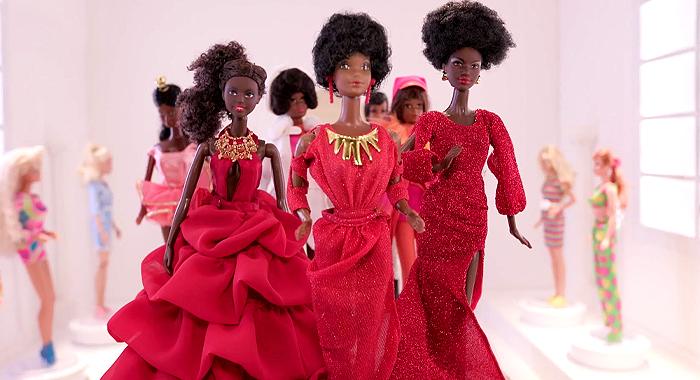
(Photo by ©Netflix)
Greta Gerwig’s massively successful Barbie told the story of the blonde-haired, blue-eyed “Stereotypical Barbie” (Margot Robbie) finding meaning. But what’s the story of Barbie’s Black counterpart? Netflix’s Black Barbie, directed by Lagueria Davis, documents the cultural and socioeconomic impact of Mattel’s introduction of African American Barbie dolls. In a time when white features were considered the standard of beauty, the introduction of Black Barbie marked a significant shift towards visibility and progression for children who didn’t have any toys that looked like them. Hear from the creators who helped make the idea a reality, alongside notable actresses, comedians, and executives who reflect on the effects their Black dolls had on them while coming of age when the film premieres on Netflix on Juneteenth.
Thumbnail images by Netflix, Everett Collection, Michael Parmalee/©FX






